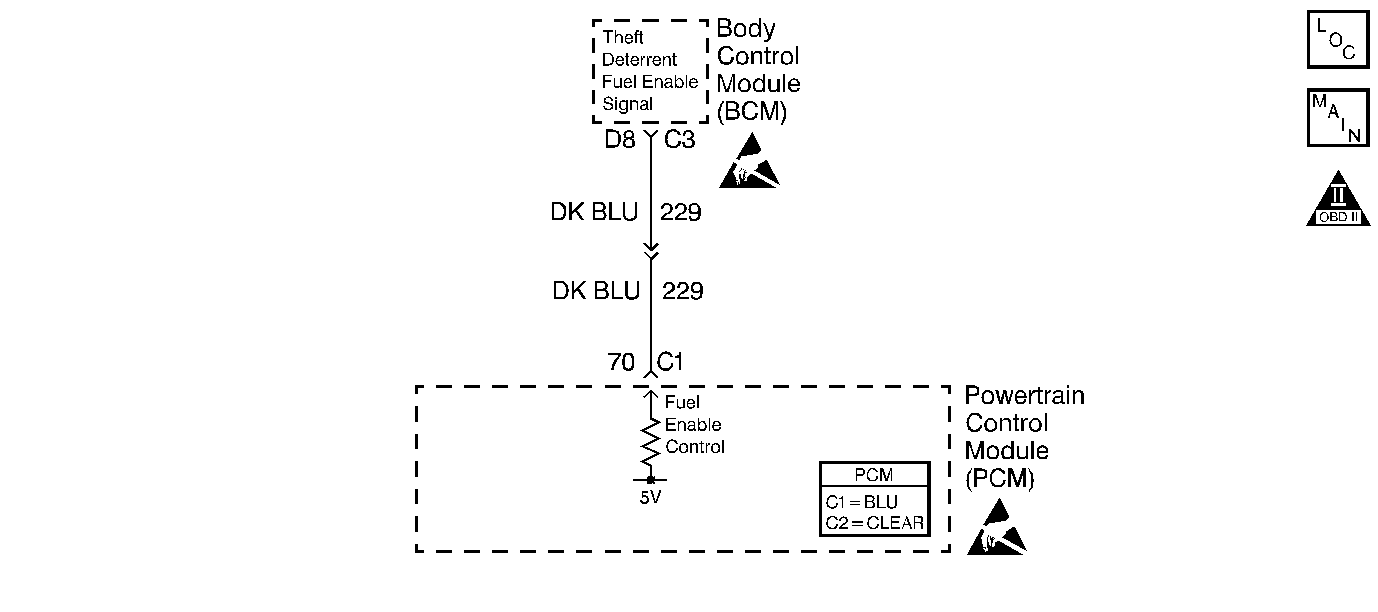
Circuit Description
The body control module (BCM) produces the Theft Deterrent Fuel Enable signal when ignition is ON and the proper key resistor pellet is sensed. The PCM monitors the Fuel Enable signal during crank. If the proper signal is present on the Theft Deterrent Fuel Enable circuit, the PCM enables fuel delivery to allow the engine to start. If the PCM detects that the fuel enable signal is not present or incorrect while the engine is running, DTC P1626 will be set. DTC P1626 can cause a no-start condition or normal operation depending on when the loss of the fuel enable signal was detected. The engine will continue to start and run if the condition that set DTC P1626 occurred after the BCM sensed the proper key resistor pellet and signaled the PCM to continue fuel delivery. The engine will start and immediately stall if the condition that set DTC P1626 occurred before the BCM sensed the proper key resistor pellet. With this condition present, the PCM will inhibit fuel delivery and the BCM will disable the starter. If the problem affects inputs to the BCM, the starter motor may be disabled. If this condition is present, refer to Vehicle Theft Deterrent System for further diagnosis.
Conditions for Running the DTC
The engine is running.
Conditions for Setting the DTC
| • | The PCM detects an incorrect signal on the Theft Deterrent Fuel Enable Circuit. |
| • | The condition is present for more than 2 seconds. |
Action Taken When the DTC Sets
The PCM stores conditions which were present when the DTC set as Failure Records only. This information will not be stored as Freeze Frame Records.
Conditions for Clearing the MIL/DTC
| • | The DTC becomes history when the conditions for setting the DTC are no longer present. |
| • | The history DTC clears after 40 malfunction free warm-up cycles. |
| • | The PCM receives a clear code command from the scan tool. |
Diagnostic Aids
Inspect for the following:
Many situations may lead to an intermittent condition. Perform each inspection or test as directed.
Important: : Remove any debris from the connector surfaces before servicing a component. Inspect the connector gaskets when diagnosing or replacing a component. Ensure that the gaskets are installed correctly. The gaskets prevent contaminate intrusion.
| • | Loose terminal connection |
| - | Use a corresponding mating terminal to test for proper tension. Refer to Testing for Intermittent Conditions and Poor Connections , and to Connector Repairs in Wiring Systems for diagnosis and repair. |
| - | Inspect the harness connectors for backed out terminals, improper mating, broken locks, improperly formed or damaged terminals, and faulty terminal to wire connection. Refer to Testing for Intermittent Conditions and Poor Connections , and to Connector Repairs in Wiring Systems for diagnosis and repair. |
| • | Damaged harness--Inspect the wiring harness for damage. If the harness inspection does not reveal a problem, observe the display on the scan tool while moving connectors and wiring harnesses related to the sensor. A change in the scan tool display may indicate the location of the fault. Refer to Wiring Repairs in Wiring Systems for diagnosis and repair. |
| • | Inspect the powertrain control module (PCM) and the engine grounds for clean and secure connections. Refer to Wiring Repairs in Wiring Systems for diagnosis and repair. |
If the condition is determined to be intermittent, reviewing the Snapshot or Freeze Frame/Failure Records may be useful in determining when the DTC or condition was identified.
Test Description
The numbers below refer to the step numbers on the diagnostic table.
Step | Action | Values | Yes | No |
|---|---|---|---|---|
1 | Did you perform the Powertrain On-Board Diagnostic (OBD) System Check performed? | -- | ||
2 |
Important:: Before continuing, ensure that the vehicle battery is fully charged. Attempt to start the engine. Does the engine crank? | -- | Go to Diagnostic System Check - Theft Deterrent in Theft Deterrent | |
3 |
Does the voltage measure at or near the specified value? | 5V | ||
4 |
Does the frequency measure within the specified range? | 40-60 Hz | ||
5 |
Does the vehicle start and continue running? | -- | Go to Diagnostic Aids | |
6 | Test the vehicle theft deterrent fuel enable circuit for an open, short to ground, or short to voltage. Refer to Circuit Testing and Wiring Repairs in Wiring Systems. Did you find and correct the condition? | -- | ||
7 | Inspect the theft deterrent fuel enable circuit for a poor connection at the PCM. Refer to Testing for Intermittent Conditions and Poor Connections and Connector Repairs in Wiring Systems. Did you find and correct the condition? | -- | ||
8 | Inspect for poor connections at the BCM. Refer to Testing for Intermittent Conditions and Poor Connections and Connector Repairs in Wiring Systems. Did you find and correct the condition? | -- | ||
|
Important: The replacement PCM must be programmed. Replace the PCM. Refer to Powertrain Control Module Replacement/Programming . Did you complete the replacement? | -- | -- | ||
10 | Replace the BCM. Refer to Body Control Module Replacement in Body Control System. Did you complete the replacement? | -- | -- | |
11 |
Does the scan tool indicate Active? | -- | System OK |
